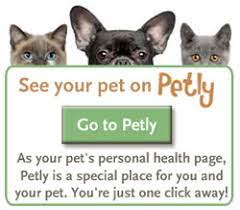What Pet Owners Need To Know About Rabies Vaccinations
in New York State
(Effective November 20, 2002, this information sheet must be provided by pet dealers to consumers upon point of sale of cats, dogs, and ferrets.)
STATE LATE REQUIRES RABIES VACCINATIONS FOR ALL CATS, DOGS AND PET FERRETS
Where can I get my pet vaccinated?
Rabies vaccinations are also available from your veterinarian for dogs, cats and ferrets. If you have questions about new vaccines developed specifically for cats and for pets at younger ages, contact your county health department or veterinarian. All counties are required to provide a free vaccination clinic every four months. Contact your county health department for the schedule in your area.
When should my pet receive its first Rabies vaccination?
The law requires that your pet's first Rabies vaccination be given no later than four months after its date of birth. Many Rabies vaccines are licensed for use at three months, although some may be given at younger ages.
When should my pet receive its second Rabies vaccination?
Your pet should receive its second Rabies vaccination within one year of the initial vaccination. The second Rabies shot and all shots thereafter are sometimes called booster shots and they can last for three years.
After my pet gets its second rabies shot, when is the next booster shot due?
After the second rabies shot, you only need to get additional booster shots every three years if the vaccination clinic or your veterinarian is using a Rabies vaccine licensed for three years.
What proof will I have that my pet received its Rabies shot?
The veterinarian, or a person under the veterinarian's supervision, will provide you with a certificate as proof that your pet has been vaccinated. The veterinarian's office will also keep a copy of your pet's vaccination certificate. The law requires the veterinarian to provide the vaccination certificate to any public health official for any case involving your dog, cat, or ferret that may have been exposed to Rabies, or in any case of possible exposure of a person or another animal to Rabies.
What if my pet needs to be taken to the veterinarian?
Whenever you bring your pet to a veterinarian, s/he will verify if the animal is up to date on its Rabies shots. If the animal is not up to date on its Rabies shots, is exempt as stated below, or if the veterinarian cannot find proof of the animal's Rabies vaccination history, you will be required to have your pet vaccinated for rabies at that time.
If my pet bites a person, does it have to be euthanized (put to sleep)?
If your pet bites a person and does not show any potential signs of rabies, it must be confined and observed for ten days. If your pet is not up to date on its Rabies shots, the ten day confinement/observation period must take place at the owner's expense at an appropriate facility such as an animal shelter, veterinary office, or kennel. This guidance will be given to you by the Health Department. If your pet is up to date on its Rabies shot, the county health department may allow the ten day confinement/observation period to take place in your home. During the ten day confinement/observation period, the county or a designated party must verify that your pet is under confinement and observation, and has remained healthy during and at end of the ten day period.
Fines
If your dog, cat, or domesticated ferret is not vaccinated, is not up to date on its vaccinations, or is not properly confined after biting someone, as the owner you shall be subject to a fine not to exceed $200 for each offense.
This may vary based on your county regulations.
Exemptions
The vaccination requirements shall not apply to any dog, cat, or domesticated ferret if the animal is transported through New York State and remains in the state 15 days or less; the animal is confined to the premises of an incorporated society devoted to the care of lost, stray or homeless animals; a licensed veterinarian has determined that the vaccination will adversely affect the animal's health; the animal is confined to the premises of a college or other educational or research institution for research purposes; or if the animal is unowned (feral, wild, not socialized).
NYSDOH, 11/20/2002
in New York State
(Effective November 20, 2002, this information sheet must be provided by pet dealers to consumers upon point of sale of cats, dogs, and ferrets.)
STATE LATE REQUIRES RABIES VACCINATIONS FOR ALL CATS, DOGS AND PET FERRETS
Where can I get my pet vaccinated?
Rabies vaccinations are also available from your veterinarian for dogs, cats and ferrets. If you have questions about new vaccines developed specifically for cats and for pets at younger ages, contact your county health department or veterinarian. All counties are required to provide a free vaccination clinic every four months. Contact your county health department for the schedule in your area.
When should my pet receive its first Rabies vaccination?
The law requires that your pet's first Rabies vaccination be given no later than four months after its date of birth. Many Rabies vaccines are licensed for use at three months, although some may be given at younger ages.
When should my pet receive its second Rabies vaccination?
Your pet should receive its second Rabies vaccination within one year of the initial vaccination. The second Rabies shot and all shots thereafter are sometimes called booster shots and they can last for three years.
After my pet gets its second rabies shot, when is the next booster shot due?
After the second rabies shot, you only need to get additional booster shots every three years if the vaccination clinic or your veterinarian is using a Rabies vaccine licensed for three years.
What proof will I have that my pet received its Rabies shot?
The veterinarian, or a person under the veterinarian's supervision, will provide you with a certificate as proof that your pet has been vaccinated. The veterinarian's office will also keep a copy of your pet's vaccination certificate. The law requires the veterinarian to provide the vaccination certificate to any public health official for any case involving your dog, cat, or ferret that may have been exposed to Rabies, or in any case of possible exposure of a person or another animal to Rabies.
What if my pet needs to be taken to the veterinarian?
Whenever you bring your pet to a veterinarian, s/he will verify if the animal is up to date on its Rabies shots. If the animal is not up to date on its Rabies shots, is exempt as stated below, or if the veterinarian cannot find proof of the animal's Rabies vaccination history, you will be required to have your pet vaccinated for rabies at that time.
If my pet bites a person, does it have to be euthanized (put to sleep)?
If your pet bites a person and does not show any potential signs of rabies, it must be confined and observed for ten days. If your pet is not up to date on its Rabies shots, the ten day confinement/observation period must take place at the owner's expense at an appropriate facility such as an animal shelter, veterinary office, or kennel. This guidance will be given to you by the Health Department. If your pet is up to date on its Rabies shot, the county health department may allow the ten day confinement/observation period to take place in your home. During the ten day confinement/observation period, the county or a designated party must verify that your pet is under confinement and observation, and has remained healthy during and at end of the ten day period.
Fines
If your dog, cat, or domesticated ferret is not vaccinated, is not up to date on its vaccinations, or is not properly confined after biting someone, as the owner you shall be subject to a fine not to exceed $200 for each offense.
This may vary based on your county regulations.
Exemptions
The vaccination requirements shall not apply to any dog, cat, or domesticated ferret if the animal is transported through New York State and remains in the state 15 days or less; the animal is confined to the premises of an incorporated society devoted to the care of lost, stray or homeless animals; a licensed veterinarian has determined that the vaccination will adversely affect the animal's health; the animal is confined to the premises of a college or other educational or research institution for research purposes; or if the animal is unowned (feral, wild, not socialized).
NYSDOH, 11/20/2002
Office HoursMonday: 8:00 am to 5:00 pm Tuesday: 8:00 am to 7:00 pm Wednesday: 8:00am to 5:00pm Thursday: 8:00 am to 7:00 pm Friday: 8:00 am to 5:00 pm Saturday: Closed Sunday: Closed In the event of a medical emergency outside our normal business hours please visit: Contact Us-Emergency Information |
|
Site powered by Weebly. Managed by IDEXX Laboratories





